Surprisingly Racist Episodes of Beloved TV Shows
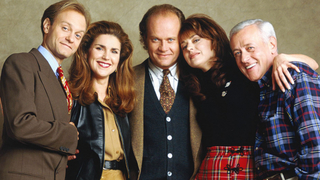
Obviously it's no secret that there have been a lot of crazy racist TV shows over the years, from Amos 'n' Andy to the years of psychological torture Fez was forced to endure on That '70s Show. Well guess what, even some of your favorite series have some uncomfortable episodes, such as ...
Saved by the Bell-- Zack Insults All of Native American Culture in Just 22 Minutes
Saved by the Bell was basically an unending gauntlet of wildly sociopathic schemes perpetrated by Zack Morris which somehow didn't torpedo his path to becoming the goddamn Governor of California. One episode that is especially uncomfortable today is "Running Zack" in which the Bayside gange are tasked with doing a class presentation about their ancestors. Zack finds an old photo of a Native American man in his parents' belongings and randomly concludes that he must be part Indigenous. So he does a half-assed presentation about this wild assumption.
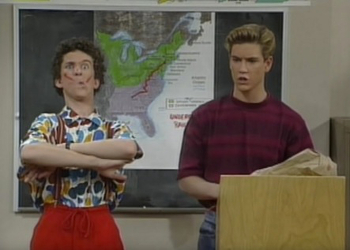
The teacher calls out for his lack of thoroughness, but instead of simply failing Zack and teaching him a valuable lesson about consequences, she sends him to hang out with her surfer buddy who happens to be Native American -- because back in the '90s, sending students to hang out with random adults in their filthy junk-filled apartments was totally cool apparently.
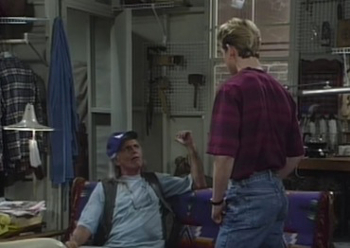
Zack realizes the error of his ways and re-does his presentation, this time in full headdress and face-paint. Again, this is supposed to be the good, more acceptable version of the report.
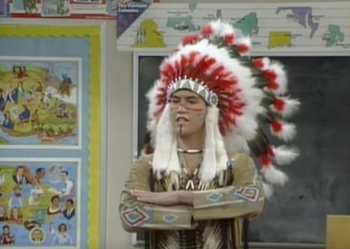
And in the end, "Chief Henry" somehow dies and visits Zack as a ghost in order to help him win an upcoming track meet -- because that poor guy's dying wish was for some reason to help the athletic career of an affluent teen he met briefly in his final days.
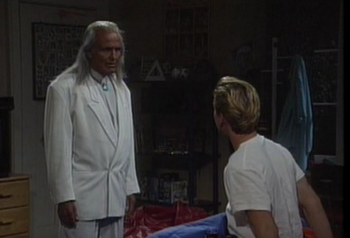
Or it may have been a dream birthed by Zack's guilty white subconscious. Either way the episode is so insulting, actor Mark-Paul Gosselaar later apologized for it -- and he never even said sorry for promoting the idea that college students could totally murder their roomate and receive straight A's.
Frasier-- Dr. Crane's Worst Nightmare is a Black Co-Worker
Frasier is one of the funniest TV comedies of all-time, but it's also whiter than a Mormon bleach factory. The show's few attempts to address its lack of diversity (to put it in terms Frasier Crane could understand) went over about as well as Bruckner's Third Symphony. In the episode "There's Something About Dr. Mary" Frasier's radio call-in show gets a new producer, a black woman named Mary. Almost immediately Mary is talking so frequently she becomes a part of the show and even dubs herself "Dr. Mary" despite the fact that she's as much of a real doctor as ... well Dr. Phil.
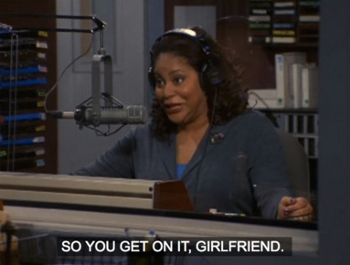
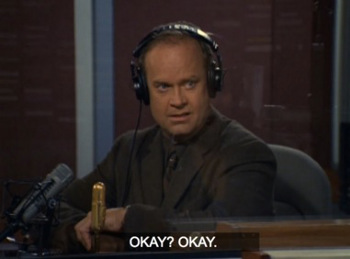
Frasier is super-pissed, but he stays quiet for fear of being perceived as a racist. In the episode's cringiest scene, he role-plays how he thinks Mary would respond to his criticisms, which involves a tone-deaf impression in which he uses both the words "Uppity" and "Massa."
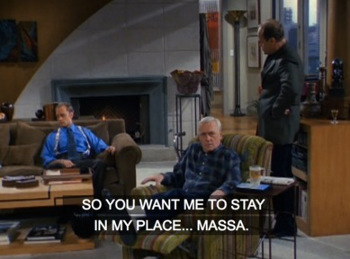
Which is obviously a wildly cartoonish way for him to assume his human co-worker will react. But even if we were meant to laugh at Frasier's ignorance, his racist paranoia isn't rebuked by the show, it's only confirmed. Mary is made a full-fledged co-host and they're given a new producer; another black woman, who also monopolizes the show. Frasier literally isn't able to speak anymore because two black women are in the room.
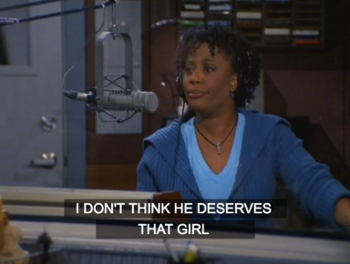
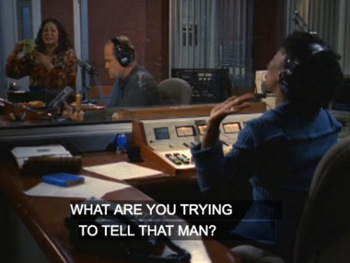
He finally reveals his feelings to Mary, and confides that he feared she'd "react the wrong way" because she's black. Oddly she's totally cool with this and immediately just tries to make Frasier feel better about the whole thing.
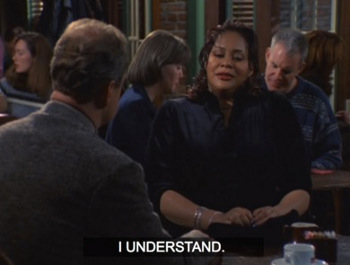
It turns out she's been offered her own radio show, so it's not a big problem ... until she shows up in a future episode where, again, the problem is she talks too much for Frasier's liking.
Are You Afraid of the Dark-- A Teenager is Haunted by Literal Black People
Are You Afraid of the Dark was a beloved '90s horror anthology for kids, in which members of the "Midnight Society" took turns telling creepy stories around a campfire. Although in retrospect, none of these macabre tales were nearly as unnerving as the thought of a bunch of unruly minors congregating in the woods with no adult supervision. One such yarn was "The Tale of the Super Specs" which begins with a teen couple visiting an occult shop (which were more common than friggin' Starbucks in the Are You Afraid of the Dark-verse).
The boyfriend is named Weeds, which is a great name for a Showtime dramedy, but kind of a weird one for a human child. Weeds is black and immediately gets invested in the study of Voodo, whereas his white girlfriend Marybeth meanwhile buys a pair of X-Ray Specs, which promptly become cursed with said Voodoo. Meaning that when she puts her new glasses on she becomes haunted by literal black people -- as in mysterious figures who are covered from head-to-toe in black. In one scene they're (gasp) playing basketball!
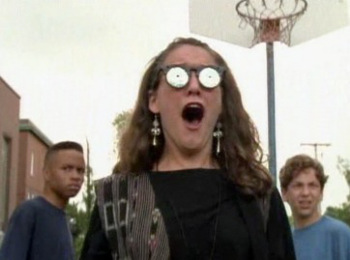
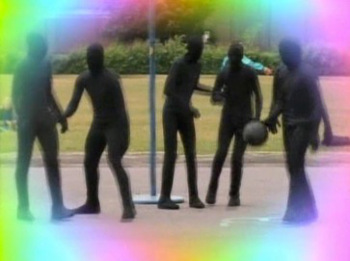
Her boyfriend, incidentally, can't see them. In the end, they have to hold a seance to get rid of the black people, who are from another dimension or something.
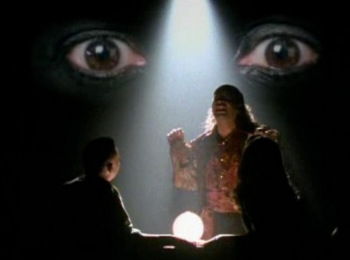
In recent years, the episode has been criticized for its casual racism. Or is it secretly a satirical look at hysterical white suburban prejudice? Then again, perhaps we're expecting too much from the show that also gave us a pint-sized Ryan Gosling being terrorized by a demonic Gilbert Gottfried.
Unsolved MysteriesThought No One Would Notice a Dude in Blackface
Before 99% of podcasts began investigating cold cases, most mysteries just went unsolved, so they made a show about it. Beginning in the late '80s, Unsolved Mysteries documented and dramatized real-life stories ranging from missing persons cases to UFO sightings to the friggin' Mothman. The show actually did some good too. Following an episode that featured the story of a musician who had been wrongfully convicted of armed robbery, a witness and Unsolved Mysteries viewer came forward and cleared him. The culprit, it turned out, was actually this guy:
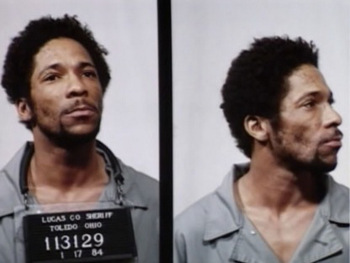
Who's briefly seen in a reenactment played by, um, this guy?
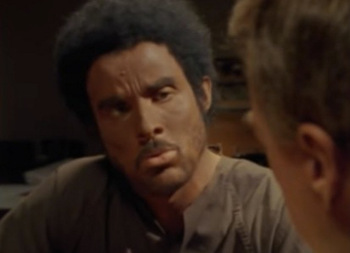
While it may have gone unnoticed at the time, a fan recently pointed out that this is totally a dude in blackface, which is ... odd. Maybe the Unsolved Mysteries reboot can devote an episode to tackling why the show somehow couldn't find a single black actor willing to appear on television.
King of the HillTries to Fix Racism with a Story About a Dog
Beloved cartoon series/flagrant propane industry propaganda King of the Hill tackled themes of discrimination in the seventh season episode "Racist Dawg" which is about, well, a racist dog. Hank is shocked when his trusty bloodhound Ladybird barks at, and later straight-up attacks, a black repairman.
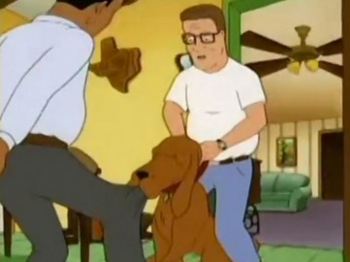
People start to think Hank is racist; he takes an online test, fails and is given dolls with different skin colors to play with. All of which is meant to underscore Hank's cluelessness, but even once Hank realizes that Ladybird simply doesn't like any repairmen, and any additional racial baggage was his, he still can't help but bother this poor guy at home just to point out that his dog isn't a racist.
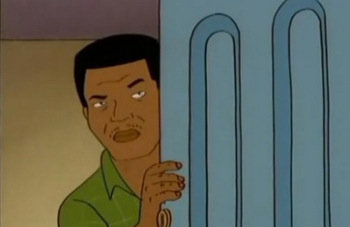
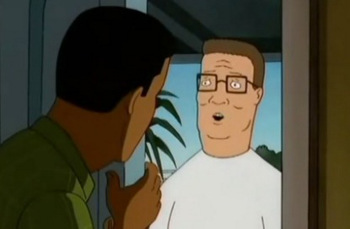
Which doesn't really fix all that much. This man still has to deal with a world full of non-canine racism, but Hank doesn't have to fully reckon with his own bias and bias accessories.
Star Trek: The Next Generation-- Captain Picard Fixes America's History of Indigenous Genocide
As much as we love it, Star Trek: The Next Generation has always been kinda racist; from the way humans ascribe insulting stereotypes to entire alien speciesto the wildly problematic episode "Code of Honor" in which the Enterprise crew journeys to a primitive planet that writers somehow refrained from dubbing "Space Africa." Also not so great: "Journey's End" which begins with Captain Picard learning that Starfleet is forcibly removing a group of colonists from a distant planet ... and they're all Native American. Why? It seems that more than 200 years ago the "American Indians" left Earth. Really there was no place left on Earth for them?
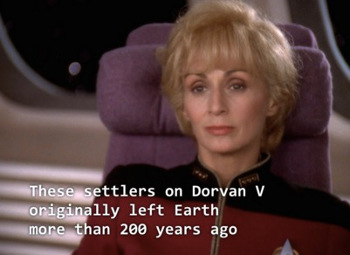
And despite the fact that it's the 24th Century, and they all got there via a warp-capable spaceship, the planet's population seems to live in small pre-industrial villages.
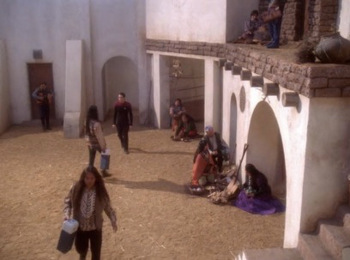
Worse still, this is all just the B-plot in service of the story of Wesley Crusher, who has become disillusioned with Starfleet. Yes, this entire episode about forced relocation and genocide is just background for a story about how the show's resident annoying white kid learns to become less of an asshole after one afternoon of political activism. Wesley actively defies Picard after befriending a villager Lakanta, who claims that Wes is "sacred". Also Wes has magical visions of his dead father.
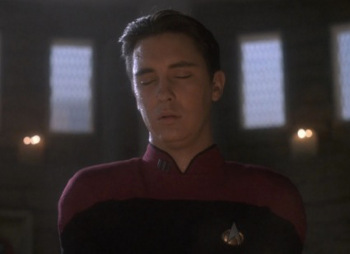
Wes completes his white savior arc and leaves with Lakanta who is really the mysterious alien "traveller" in disguise. In the end, the Indigenous colony is allowed to stay, and by not violently forcing them out of their homes, Picard has apparently fixed his ancestor's history of abetting genocide.
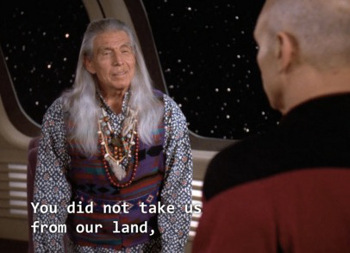
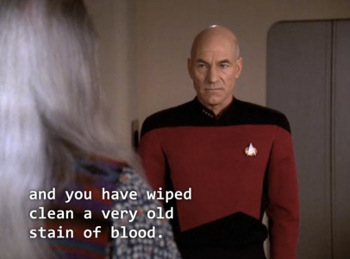
You (yes, you) shouldfollow JM on Twitter! And check out the podcastRewatchability
Top Image: NBC Universal